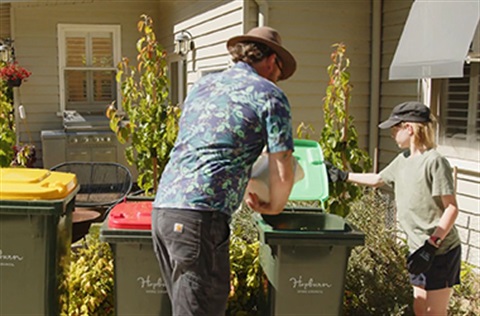Successful first five months of food and garden organics service
Published on 13 September 2024

Changes to the kerbside collection in Hepburn Shire townships started in April 2024. This included the introduction of a weekly food and garden organics service for - Creswick, Daylesford, Hepburn, Hepburn Springs and Trentham (Clunes continued from the trial) and the change to fortnightly general rubbish collection, with recycling remaining fortnightly. About 5550 households across the region are now receiving this service.
Mayor, Cr Brian Hood, said the early results from the changes are that they are working for the broader community and helping to meet our environmental goals.
“The results so far show a 26% reduction in waste sent to landfill over the five-month period. This means greenhouse gas emissions have been avoided thanks to the efforts of our community – who must be congratulated for taking on the change so well,” said Cr Hood.
The changes to Council’s waste service respond to the requirements of the Victorian Circular Economy (Waste Reduction and Recycling) Act 2021 which states that councils must provide services for collection of general rubbish, recycling, food and garden organics (and separate glass).
Around 443 tonnes of organic materials (8 April until end of August) have been collected for composting and will improve local soils.
“We know that overall people want to do what’s right for the environment and by using the new service that’s exactly what people are doing. Our contamination rate within the organics bin is only 1.6%,” he said.
Inspections undertaken two months into the project showed that most of the contamination comes from a small number of bins. The main contaminants were food in containers, bagged organics, nappies and textiles. Hepburn Shire has a bagless service.
A bagless service is deemed to be best-practice as bags can hide contaminants, don't break down quickly enough - even compostable and biodegradable ones - and bags are hard to remove from organic matter.
“Our contamination rates are currently low, and we keep this low and recover and recycle as much waste into a reusable product that we can. When organics or recycling is contaminated the cost for all of us increases,” said Cr Hood.Using the organics service is one way that the community and visitors to the region can help reduce their environmental impact and it is a key goal in Hepburn’s Sustainable Hepburn Strategy and Council Plan.
“We heard of concerns about the changes during the run up to the implementation, including at the pop-up information sessions, however early results indicate while there are still some areas for improvement most people have been able to embrace and excel at these new processes,” said Cr Hood.
Council has been supporting residents to reduce their waste to landfill through the Reusables Voucher Trial (including items such as period products and modern cloth nappies). This trial was successful with all 120 vouchers being used. The program will run again this financial year.
“We understand that there are still some in the community who may be struggling with these changes. There are options for people who still find the fortnightly rubbish a challenge and we ask that they contact our Customer Experience Team to find out more about additional bin services,” said Cr Hood.
Residents can refer to online educational videos, magnets, A-Z guides and bin lids/bin stickers for your general rubbish and recycling bins to ensure they are putting the correct items in the bin. These items can be found online, or they can visit their local Customer Service centre or Transfer Station to pick up more.
Processing of the organic material is continuing at Creswick Transfer Station. Council received grants to upgrade the site, and the new and improved units operated by Gaia EnviroTech are now operational. The new units took learnings from the previous in-vessel composting units used during the Clunes Trial. They are better at retaining heat and water, which means the composting process occurs more efficiently. These improvements include new drop-off points for organics at all three transfer stations.
Audits of kerbside bins are planned in the coming months to provide more information on the diversion of organics that has been achieved.
“We understand these changes have provided some challenges, but we appreciate the effort the community has gone to place items in the correct bins, put the correct bins out, inform us of issues, reduce waste to landfill and to help create great quality compost to improve local soils,” said Cr Hood.